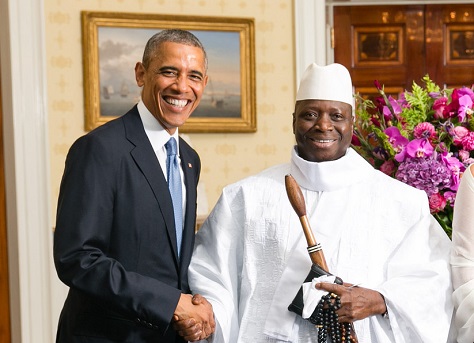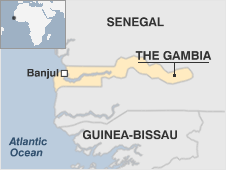When you start to add up all the abuses of Gambian president Yahya Jammeh’s 20-year dictatorship, you might think it’s a real shame that Tuesday’s coup attempt has apparently failed.![]()
Though Gambian officials are reporting that the coup has failed, and other officials are denying that a coup attempt even took place, it’s hard to know just exactly what is happening in the capital city of Banjul. Jammeh is said to be out of the country, though conflicting reports have placed him on official business in France as well as on a personal trip to Dubai. In short, no one know what’s happened (or may still be going on in Gambia) and no one knows where Jammeh is currently located.
Gambia served for centuries as a Portuguese trading colony before it became a British protectorate in 1894. An overwhelmingly Muslim country, it won its independence from the United Kingdom in 1965, and it’s known just two leaders in that time — Dawfa Jawara, who ruled as prime minister or president from 1965 to 1994, and his successor, Jammeh, who ousted Jawara in a chiefly bloodless coup at the tender age of 29. What followed could hardly be called bloodless, however.
Since 1994, Jammeh’s record has been dotted with human rights violations that rank among some of the worst in sub-Saharan Africa, in marked contrast to the conciliatory approach Jawara deployed for the first three decades of post-independence Gambia. Though Jammeh (pictured above earlier this year with US president Barack Obama) might not rise to the level of abuse reserved for butchers like former Ugandan dictator Idi Amin, former Liberian president Charles Taylor or former CAR president Jean-Bédel Bokassa, he must certainly rank high on the list of Africa’s most brutal leaders today, earning international scorn for his approach to the death penalty, press freedom and LGBT rights, in particular:
- He engineered his own election as president in 1996 after banning the participation of other viable Gambian political parties at the time.
- Gambian forces in 2000 killed at least 12 students who were protesting the alleged murder of another student.
- Jammeh introduced a draconian media law in 2002 that highly restricts press freedom, and one of Gambia’s leading journalists, Deyda Hydara, was shot to death in 2004. Freedom International rates Gambia today as one of the worst offenders in the world for press freedom.
- In 2007, Jammeh claimed that he could cure HIV with a treatment consisting entirely of natural herbs, a line that he has consistently maintained over the years in the face of overwhelming scientific evidence to the contrary.
- Jammeh advocated cutting off the heads of Gambian homosexuals in 2008, and he has increasingly persecuted the LGBT community in recent years, so much so that the United States last week removed Gambia from the list of countries eligible to export duty-free goods to the United State under African Growth and Opportunity Act. At the United Nations last year, Jammeh decried homosexuality as evil, anti-human and ‘anti-Allah,’ and earlier this year he referred to homosexuals as ‘vermins,’ joking that LGBT stands for ‘leprosy, gonorrhea, bacteria and tuberculosis.’ Under a new law, homosexuality can be punished by life imprisonment.
- In 2009, Jammeh allegedly used a campaign against witchcraft to detain hundreds of regime opponents.
- Invoking widespread international condemnation, Gambia executed nine death row prisoners by firing squad, the first executions in 27 years.
- Jammeh suddenly decided to remove Gambia from the Commonwealth in 2013, calling it a neo-colonial institution, further exacerbating Gambia’s international ties to Europe.
That’s in addition to widespread reports of torture, disappearances and repression over two decades, largely at the hands of a terrifying group called the Junglers.
It’s no wonder that disgruntled military forces might try to launch a coup while Jammeh was out of the country.
As Jeffrey Smith wrote earlier this month, there’s a lot that the United States could be doing to nudge Gambia out of repression, starting with excluding the country from AGOA eligibility, including restrictions on Jammeh’s travel and sanctions freezing his assets in the United States.
Gambia’s political situation and human rights abuses stand in contrast to its neighbor, Senegal, which surrounds the entirety of Gambia, excepting the Gambian coastline along the Atlantic Ocean. Senegal is one of west Africa’s strongest democracies, with an entrenched tradition of rule of law, voting rights and other freedoms. Though the two countries feature different colonial backgrounds (Senegal was colonized by the French, not the British) and different ethnic groups, they formed the ‘Senegambia’ confederation from 1982 to 1989 out of security concerns, following an initial coup attempt against Jawara spooked Gambia and Senegalese elites alike. As the Cold War era waned, and security concerns faded, the confederation fell apart and today, the Senegalese and Gambian approaches to governance vary more than ever.
Gambia, which lacks material oil wealth, and exports largely peanuts and other agricultural products, is a top destination for tourism, chiefly from the United Kingdom and elsewhere in Europe, notwithstanding Jammeh’s erratic and repressive record. With a disruptive 2012 military coup temporarily plunging Mali into a civil war against Islamic jihadists and with the ouster of longtime Burkina Faso president Blaise Compaoré in October, Tuesday’s events could mark the start of a turbulent time for Jammeh in the new year.


One thought on “Who is Yahya Jammeh? A look at Gambia’s erratic dictator.”